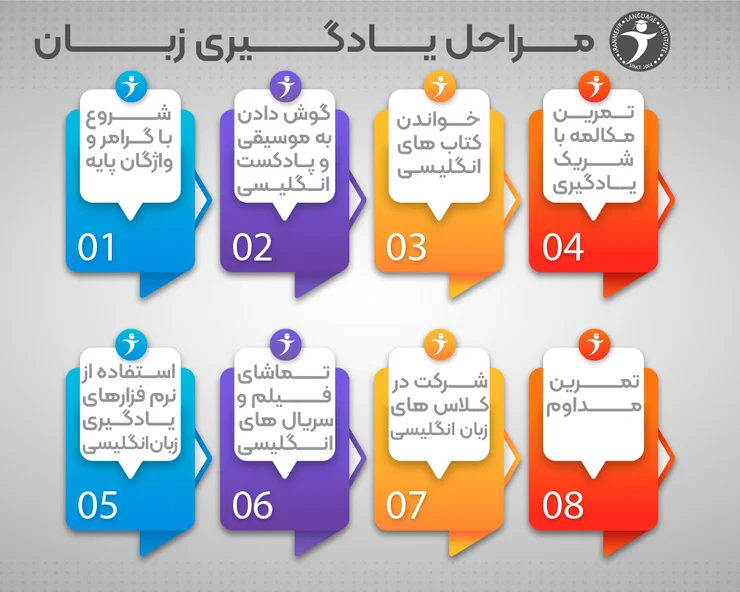خوشبختانه ما آنقدر در مقالات مختلف راجع به ساختار و کاربرد افعال عبارتی (Phrasal verb) توضیح دادهایم که با آنها به خوبی آشنا شده باشید. البته اگر مدت زیادی نیست که ایرانمهر را همراهی میکنید، پس با چند جستجوی ساده میتوانید مقالات مرتبط را پیدا کنید. برای مثال، میتوانید مقالهی «شش راه برای یادگیری افعال عبارتی» را مطالعه کنید. اما ما فرض را روی این میگذاریم که شما در حال حاضر، میدانید که افعال عبارتی مفاهیمی اصطلاحی دارند. معنی این دسته از افعال را نمیتوان بر اساس معنی فعل مستقل حدس زد.
متاسفانه، تنها راه یادگیری افعال عبارتی، تمرین در مکالمه و نوشتن است. هیچ قانون و الگوی خاصی برای استفاده از این افعال وجود ندارد. پس برای یادگیری آنها که تعداد زیادی هم دارند، باید از حافظهی خود استفاده کنید. برای حفظ این افعال، آنقدر تمرین کنید تا با ترکیبات کاملا آشنا شوید و بدون کمک دیکشنری و اینترنت، از آنها استفاده کنید.
در ادامه، ما لیستی از پرکاربردترین افعال عبارتی را برای شما تهیه کردهایم. لیستی که علاوه بر فعل، مثال آن در جمله را نیز مشخص میکند. اما به خاطر داشته باشید، برخی از افعال عبارتی چند معنی مختلف دارند که هیچ کدام هم ربطی بهم ندارند. بهترین راه برای بررسی معنی، رجوع به دیکشنری و بررسی مثالهای مختلف است. ما در این مورد دیکشنری تک زبانهی لانگ من و آکسفورد را معرفی میکنیم.
برای اینکه این افعال را به خوبی یاد بگیرید، توصیه میکنیم که علاوه بر معنی، حتما مثالها را چک کنید و سعی کنید افعال را داخل مثال یاد بگیرید. به این ترتیب، هیچگاه از ذهنتان فرار نمیکنند و بعدا میتوانید در موقعیتهای مختلف از آنها استفاده کنید.
افعال عبارتی با be
|
Phrasal Verb |
Definition |
Example sentence |
| be about to |
قصد انجام یک کار در آیندهای نزدیک |
“Hi Johnny, I was about to call you.” |
| be after (someone) |
منتظر ماندن، شکار ، تعقیب کردن کسی |
“The police are after a man who robbed a bank yesterday.” |
| be after (something) |
چیزی را از کسی خواستن |
“He’s being so nice to me these days. He is after something, for sure.” |
| be down to |
نتیجه یا علت چیزی |
“A large number of diseases are down to genetic traits.” |
| be down with |
رنج بردن از یک بیماری |
“I can’t go to work today because I am down with the flu.” |
| be in |
در مکان مشخص شده حاضر شدن |
“I’m afraid Molly is not in at the moment.”
“I will let you know as soon as the doctor is in.” |
| be into |
تا حد زیادی چیزی را دوست داشتن، مشتاق بودن |
“I’m really into this band right now.” |
| be over |
تمام شدن |
“The worst is over. He should start to recover in a few days.”
“It’s over between us; we can’t see each other anymore.” |
| be out of |
در دسترس نداشتن چیزی |
“Sorry, but we are out of coffee at the moment.” |
| be up |
افزایش یافتن |
“The price of gas is up again.” |
| be up |
خبری در راه بودن، اتفاق در حال وقوع |
“Something is up; the staff are all acting strange.” |
| be up |
بیدار شدن |
“John’s not up yet. He’s still sleeping.” |
| be up against |
درگیر شدن |
“I’m up against a lot of competition these days.” |
| be up to |
دلبخواهی بودن، اختیاری بودن |
“For now, the planning stage is up to you.” |
| be up to |
از نقشه و برنامهی کسی باخبر شدن |
“I am going to see what the children are up to.” |
| be up to |
توانایی انجام کاری |
“We’ll have to fire him. He isn’t up to the job.” |
دوره های آموزش زبان انگلیسی |
|
| دوره حضوری | آموزش زبان انگلیسی برای کودکان |
| دوره حضوری | آموزش زبان انگلیسی برای نوجوانان |
| دوره حضوری | آموزش زبان انگلیسی برای بزرگسالان |
افعال عبارتی با فعل come
|
Phrasal Verb |
Definition | Example sentence |
| come across |
تعجب کردن |
“I came across that old watch of mine when I was cleaning out the drawers.” |
| come across |
به نظر آمدن |
“She comes across as a really confident person.” |
| come into |
به دست آوردن (بخصوص اگر چیزی از طریق ارثیه یا شانس به دست بیاید) |
“John has been buying some flashy cars lately. He must have come into a bit of money.” |
| come up with |
اختراع کردن، توسعه دادن، فکر کردن |
“I’m finding it difficult to come up with new ideas.” |
| come up against |
با مشکلات مختلفی مواجه شدن |
“We’ve come up against several political and legal problems.” |
| come down with |
تسلیم بیماری یا ویروس شدن |
“I don’t feel very well today. I think I’ve come down with the flu.” |
| come (a)round |
کنار آمدن ، تغییر عقیده دادن |
“Your father doesn’t want you to have a dog, but give him a day or two and I’m sure he’ll come (a)round.” |
| come back to |
به خاطر آوردن |
“I couldn’t remember her name, but after a few minutes it came back to me.” |
افعال عبارتی با فعل Get
|
Phrasal Verb |
Definition | Example sentence |
| get over |
بهتر شدن، کنار آمدن |
“I can’t seem to get over the death of my cat. I feel sadder as the days go by.” |
| get over |
باور داشتن، درک کردن |
“I can’t get over the way she spoke to me. She has no manners whatsoever.” |
| get on |
با کسی به خوبی کنار آمدن |
“My husband and I get on so well together.” |
| get away |
فرار کردن، دور شدن |
“The police tried to catch the bank robbers but they managed to get away.” |
| get away with |
قسر در رفتن، سرزنش نشدن |
“The criminal got away with the crime. There wasn’t enough evidence to convict him.” |
| get out of |
خلاص شدن |
“How can I get out of this mess I’m in.” |
| get (a)round to |
مهلت یا فرصت پیدا کردن |
“I still haven’t gotten (a)round to fixing the broken shutter.” |
| get back |
برگشتن (معمولا به خانه برگشتن) |
“What time did you get back last night?” |
| get rid of |
خلاص شدن از شر چیزی |
“I want to get rid of that old mattress.” |
| Get through to |
با کسی ارتباط (تلفنی) داشتن |
“I can’t get through to Sally. Her phone has been busy all morning.” |
| get through to |
به کسی چیزی را فهماندن |
“It is difficult to get through to him—he never listens to a word you say.” |
| get through to |
به مرحلهی بهتری دست پیدا کردن، ارتقاء به مرحلهای بالاتر در مسابقه |
“We won in overtime and managed to get through to the finals.” |
افعال عبارتی با فعل give
|
Phrasal Verb |
Definition | Example sentence |
| give away |
بخشیدن |
“He’s a generous man. He gives away half of his salary to charity each month.” |
| give away |
تحویل عروس به داماد توسط پدر در کلیسا |
“In some countries, it is the custom for the father of the bride to give his daughter away at the wedding.” |
| give back |
چیزی را به کسی پس دادن |
“Can you give back that book I lent you?” |
| give in (to something) |
تسلیم شدن |
“No matter how much they try to get you to accept a lower offer, don’t give in.”
“If you are on a diet, it’s hard not to give in to temptation.” |
| give in |
فرو ریختن |
“The floor gave in after the flood.” |
| give out |
پخش کردن |
“Can you give out these books to the rest of the class please?” |
| give up |
واگذار کردن موقعیت و پوزیشن یک شخص به شخصی دیگر |
“When I am on the bus, I rarely see anyone give up their seat to the elderly.” |
| give up |
تسلیم شدن |
“The doctor has told me to give up smoking.” |
| give up |
رها کردن |
“After searching for hours on end, the mountain rescue team finally gave up all hope of finding the missing hikers. |
افعال عبارتی با فعل look
|
Phrasal Verb |
Definition | Example sentence |
| look into |
تحقیق کردن |
“The police are looking into reports of a robbery last night.” |
| look up |
دنبال اطلاعات خاصی گشتن (از روی لیست یا مرجع مشخص) |
“Can you look up John’s phone number for me please?” |
| look forward to |
اشتیاق داشتن |
“I am looking forward to seeing my family again after six months of living abroad.” |
| look out |
احتیاط کردن |
“Look out, there’s a car coming!” |
| look after |
مراقبت کردن |
“Can you look after my cat while I’m away?” |
| look down on |
با دیدهی تحقیر به کسی نگاه کردن |
“My neighbors look down on us because we have less money.” |
| look on |
تماشا کردن |
“The crowd looked on as the firemen tried to put out the fire.” |
| look over |
ملاحظه کردن |
“He carefully looked over the contract before signing it.” |
| look up to |
تحسین کردن، احترام گذاشتن |
“She really looks up to her boss. He has taught her many things.” |
فعل عبارتی با break
|
Phrasal Verb |
Definition | Example sentence |
| break down |
خراب شدن |
“My car broke down on the highway today.” |
| break down |
از نظر احساسی شکسته شدن |
“She broke down when she was told her cat had died.” |
| break up |
کات کردن، اتمام یک رابطهی رمانتیک |
“Have you heard the news? Sally and John broke up.” |
| break into |
به زور وارد شدن |
“Burglars broke into my house last night.” |
| break away from |
آزاد کردن |
“The police caught one of the burglars, but he managed to break away from them.” |
| break out |
فرار کردن |
“The other burglar was put in prison, but he managed to break out.” |
| break out |
به سرعت پخش شدن |
“An epidemic of flu has broken out.” |
| break even |
برابر شدن سود و ضرر یک تجارت |
“The company broke even this year.” |
افعال عبارتی با فعل pick
|
Phrasal Verb |
Definition | Example sentence |
| pick up |
آوردن کسی از جایی |
“Can you pick up the children after school?” |
| pick up |
دریافت سیگنال یا پیام |
“My cell phone never picks up a signal when I’m in the house.” |
| pick on |
اذیت کردن کسی، سر به سر گذاشتن کسی |
“You’re always picking on me, and I wish you would stop.” |
| pick on |
انتخاب کردن،ترجیح دادن |
“The teacher always picks on Jane. She never gives the other students a chance to answer.” |
افعال عبارتی با فعل put
|
Phrasal Verb |
Definition | Example sentence |
| put out |
خاموش کردن |
“We have to put out the fire before it spreads to the rest of the house.” |
| put out |
بیرون کردن |
“Would you put the cat out for a while?” |
| put (someone/oneself) out |
به زحمت انداختن |
“It would be great if you could do this for me, but don’t put yourself out.” |
| put (someone) up |
میزبانی کردن |
“I can put you up for the weekend, but no longer than that.” |
| put up with |
تحمل کردن |
“He couldn’t put up with her any longer.” |
| put up with |
چیزی را برای فروش گذاشتن |
“They’ve put up their house for sale.” |
| put in |
وقت گذاشتن |
“He puts in 12 hours at work every day.” |
| put off |
تاخیر داشتن |
“See if you can put the meeting off for an hour. We still need more time.” |
| put (someone) off |
بی میل شدن |
“The sight of the octopus really put me off my food.” |
| put aside/away |
پس انداز کردن، کنار گذاشتن |
“I’ve put away/aside enough money to retire early.” |
| put aside for |
نگه داشتن |
“Could you put this blouse aside for me.” |
| put through to |
کسی را به شخصی دیگر وصل کردن |
“Could you put me through to the manager please?” |
| put through |
اذیت کردن ، آزار دادن |
“This job has put me through so much already.” |
| put away |
جمع کردن و مرتب کردن |
“Can you please put away all those books lying around?” |
| put down |
کسی را مسخره کردن یا تحقیر کردن |
“She’s always putting her boyfriend down.” |
| put down |
اتیان سازی کردن |
“Our poor cat is so old that we have to have him put down.” |
| put on |
افزایش یافتن |
“I’ve put on a lot of weight recently.” |
| put on |
وانمود کردن |
“He seems angry, but I know he’s just putting it on.” |
| put (someone) on |
فریب دادن یا اذیت کردن |
“I really thought I had won the prize. I can’t believe he was putting me on the whole time!” |
| put on |
خط تلفن را به کسی وصل کردن |
“Give me one second, and I’ll put him on.” |
افعال عبارتی با فعل run
|
Phrasal Verb |
Definition | Example sentence |
| run into |
کسی را تصادفی دیدن |
“I ran into an old friend of mine yesterday while I was out shopping.” |
| run out of |
تمام کردن |
“We’ve run out of coffee again. Could you get some on your way home?” |
| run up |
پرداخت کردن |
“He ran up a huge bill at dinner.” |
| run away with |
کسی را ترک کردن، از دست کسی فرار کردن |
“His husband ran away with the secretary.” |
| run over |
با کسی تصادف کردن |
“He’s still very upset after running over the cat last night.” |
| run through |
جمع بندی، خلاصه کردن |
“OK, can we just run through the main points again?” |
| run to |
از کسی کمک گرفتن، به کسی پناه آوردن |
“He always runs to his mother whenever he’s in trouble.” |
| run on |
تامین انرژی |
“Those new cars run on electricity, but they are so expensive.” |
| run up against |
با مشکل مواجه شدن |
“The company ran up against some problems initially, but now things are operating smoothly.” |
فعل عبارتی با take
| Phrasal Verb | Definition | Example sentence |
| take up |
شروع کردن، از سر گرفتن |
“I’m thinking of taking up a new hobby.” |
| take up |
اشغال کردن (فضا یا وقت) |
“I’m going to buy a smaller table. This takes up too much room.” |
| take up |
کوتاه کردن، تنگ کردن |
“My new pants are too long for me. I’m going to have to them taken up a bit.” |
| take to |
اشتیاق و علاقه داشتن |
“The boss has really taken to the new intern.” |
| take out |
قرارداد بستن |
“I’ve taken out an insurance policy on my house.” |
| take over |
کنترل چیزی را به دست گرفتن |
“The company has been taken over by a Spanish corporation.” |
| take off |
پرواز کردن با هواپیما |
“You’ve just missed the plane: it took off a few minutes ago.” |
| take off |
درآوردن لباس |
“Take off your jacket. It’s hot in here.” |
| take off |
موفق شدن |
“Business has really taken off this year.” |
| take off |
مرخصی گرفتن |
“I’m really tired. I’m going to take a day off tomorrow.” |
| takes after |
به کسی شباهت داشتن، به کسی رفتن (در فامیل یا خانواده) |
“He takes after his father in his love of tennis.” |
| take back |
برگرداندن |
“My new cell phone doesn’t work. I’m going to take it back tomorrow and ask for a refund.” |
| take on |
استخدام کردن |
“Why don’t you apply for a job at the new phone company? They are taking on new staff.” |
| take on |
مسئولیت زیادی قبول کردن |
“I’ve taken on too much work. How will I ever find the time to finish it all?” |
| take in |
کمک کردن |
“She’s a very kind person. She always takes in stray dogs that she finds in the street.” |
البته علاوه بر موارد بالا، افعال عبارتی دیگری نیز وجود دارند که در موارد مختلفی به کار میروند. افعالی که بر اساس موقعیت و میزان رسمی بودن زبان، انتخاب میشوند. اما لیست افعال این مقاله از جمله رایجترین افعال عبارتی هستند که توسط بومیهای انگلیسی زبان تا حد زیادی استفاده میشوند. در صورت تمایل، متنهای انگلیسی پیچیدهتری بخوانید و به تمام ساختارها و افعال دقت کنید. در صورت مشاهده، معنی آن را با مثال در دیکشنریهای تک زبانه چک کنید تا بالاخره با اکثر این افعال آشنا شوید. به یاد داشته باشید که با یادگیری این افعال، میتوانید درست شبیه بومیهای انگلیسی زبان صحبت کنید یا متنهایی کاملا منحصر به فرد و یونیک بنویسید. یادگیری افعال عبارتی در حقیقت، به تسلط و میزان مهارت شما در زبان انگلیسی کمک خواهد کرد.
بیشتر بخوانید:شش راه برای یادگیری افعال عبارتی در زبان انگلیسی
بیشتر بخوانید:آموزش افعال در زبان انگلیسی














